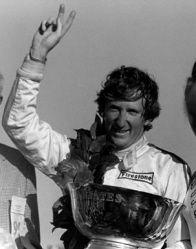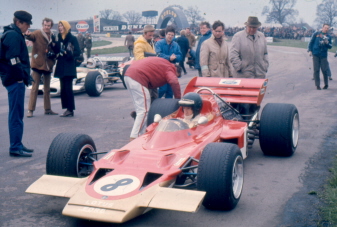Jochen Rindt

Jochen Rindt was a mercurial Austrian driver whose press-on sideways style won the admiration of many British racing enthusiasts in the 1960s.
Jochen was actually born in Germany in April 1942 but his parents were killed in a bombing raid on Hamburg in 1943, so he moved to live with his grandparents in Graz, Austria, where he grew up.
Already a man of considerably wealth thanks to a familiy stake in a spice firm, he e started racing, initially in an Alfa Romeo Giulietta Ti, in 1962. Once he reached 21 he came into his inheritance, following which a Formula Junior Cooper was bought in 1963.
For 1964 Rindt acquired a Brabham Formula 2 car, putting it on pole position for his first race, then winning the next, going on to beat all the established stars at Crystal Palace! He made his Formula 1 debut that year in the Austrian Grand Prix and for 1965 signed for Cooper, where he remained for three seasons.
Away from the Formula 1 circus, Jochen scored an unexpected victory in the prestigious Le Mans 24 Hours race, co-driving a Ferrari 250LM for the NART team with Masten Gregory.
A move to Brabham in 1968 failed to give him any tangible results due to constant problems with the Repco engines so he signed for Lotus in 1969, to drive alongside reigning World Champion, Graham Hill. He quickly established himself as the faster of the two drivers but a big accident when his rear wing collapsed in the Spanish Grand Prix put him in hospital and publicly at odds with Lotus boss Colin Chapman over the benefits of wings. His refusal to drive the new four-wheel-drive Lotus 63 also led to a deepening rift with Chapman.
After leading several Grands Prix, including an epic duel with Jackie Stewart at Silverstone, he finally broke his duck in the US Grand Prix at Watkins Glen. With the introduction of the revolutionary wedge-shaped Lotus 72 for 1970, Rindt figured it would be his best chance of becoming World Champion.
He was right, but it took time. The 72 was not quick straight out of the box and a major redesign was required, forcing the team to fall back on its trusty old warhorses, the Lotus 49s. Rindt kick-started his Championship challenge with a sensational last-lap victory in the Monaco Grand Prix and went on to win the Dutch, French, British and German Grands Prix, giving him an almost unassailable lead in the title.

Tragically, he would never live to achieve his ambition, dying in a still unexplained practice crash at Monza on September 5th 1970. Thankfully, his replacement Emerson Fittipaldi won the US Grand Prix, meaning no-one could overhaul Jochen's points tally and he became the sport's only posthumous World Champion.
